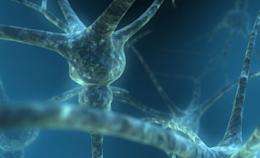'Bilingual' neurons may reveal the secrets of brain disease

(PhysOrg.com) -- A team of researchers from the University of Montreal and McGill University have discovered a type of "cellular bilingualism" – a phenomenon that allows a single neuron to use two different methods of communication to exchange information. "Our work could facilitate the identification of mechanisms that disrupt the function of dopaminergic, serotonergic and cholinergic neurons in diseases such as schizophrenia, Parkinson's and depression," wrote Dr. Louis-Eric Trudeau of the University of Montreal's Department of Pharmacology and Dr. Salah El Mestikawy, a researcher at the Douglas Mental Health University Institute and professor at McGill's Department of Psychiatry. An overview of this discovery was published in the Nature Reviews Neuroscience journal.
Their results show that many neurons in the brain are able to control cerebral activity by simultaneously using two chemical messengers or neurotransmitters. This mode of communication is known as "cotransmission." According to Dr. Trudeau, "the neurons in the nervous system – both in the brain and in the peripheral nervous system – are typically classified by the main transmitter they use." For example, dopaminergic neurons use dopamine as a transmitter to communicate important information for many different phenomena such as motivation and learning. The malfunction of these neurons is involved in serious brain diseases such as schizophrenia and Parkinson's. "Our recent research, carried out in part with Dr. Laurent Descarries at the University of Montreal, shows that dopaminergic neurons use glutamate as a second transmitter. That means they are able to transmit two types of messages in the brain, on two time scales: a fast one for glutamate and a slower one for dopamine."
Other research conducted by Dr. Salah El Mestikawy's team at the Douglas Mental Health University Institute observed the same kind of bilingualism in brain neurons that use serotonin, a group of cells that communicate important information for controlling mood, aggression, impulsivity and food intake, and also those that use acetylcholine, an important messenger for motor skills and memory that is unbalanced by Parkinson's disease, antipsychotic drugs and in drug addiction.
Joint studies carried out with their colleague Dr. Asa Wallen-Mackenzie at Uppsala University in Sweden and published recently in the Proceedings of the National Academy of Sciences journal suggest that the secretion of glutamate by dopaminergic neurons could, for example, be involved in the behavioural effects of psychostimulants such as amphetamines and cocaine. "We know very little about the role of cotransmission in disease and the regulation of behaviour, however," Dr. Trudeau warned. "That will have to be the subject of future studies."














